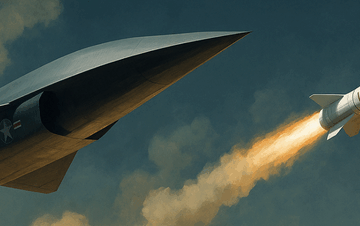Defense commentators note that adversaries, prior to acting aggressively, will first calculate risks and rewards. Significant to this calculus is an evaluation of how, if at all, America is likely to respond at different stages of any intensifying aggression, that is, at different rungs on the escalation ladder.
Historically, adversaries, ranging from Imperial Japan to Saddam Hussein’s Iraq, badly miscalculated American resolve. This was, in part, because the US did not effectively communicate national will and the country’s ability to generate combat power.
While nuclear deterrence held during the Cold War, a worrisome erosion of America’s nuclear deterrence appears underway. A combination of unilateral cuts to the American arsenal, sluggish nuclear modernization, and “nuclear psychosis” (fear of one’s own nuclear arsenal) likely led Russian President Vladimir Putin to develop an escalate to win nuclear doctrine. The same factors may also contribute to China, Iran, North Korea, and Russia issuing mounting conventional and nuclear threats against the West.
Americans need to remember that escalation dominance is an essential ingredient in effectively maintaining deterrence of adversaries and assurance of allies. Escalation dominance means having the option to retaliate up or down the escalation ladder—at America’s choosing. This means developing and fielding capabilities that at least achieve parity, if not superiority, at each rung of the escalation ladder.
Without the US investing in the needed capabilities for full-spectrum conflict, all-domain escalation dominance, adversaries can study America’s capabilities and identify gaps. They can then develop and execute successful strategies that exploit those gaps. They can also incorrectly believe gaps exist, because of a failure of American messaging. Either way, American deterrence might fail.
The US once understood the art and science of escalation dominance—including how to weigh and manage uncertainties and unavoidable risks. At the most dangerous point in the Cold War, the Cuban Missile Crisis, the US out-thought, outmaneuvered, and overmatched the Soviet Union. Soviet Premier Nikita Khrushchev backed down. President Ronald Reagan successfully escalated an arms race while also waging economic warfare. The Soviet Union collapsed.
America now faces multiple adversaries it must engage across the spectrum of conflict. Both horizontal and vertical escalation are certain. With the potential for conflicts to start in the cyber or space domain, the United States must have the ability to limit damaging incursions and malicious interference, while out-escalating an adversary.
History shows that America’s enemies, whomever they might be, tend to be relentless, brutal, casualty acceptant, and even genocidal. Current events, in conflict zones around the world, prove that this has not changed. Appeasement is as ill-advised today as it was with Nazi Germany and Imperial Japan. Restraint is also as ill-advised now as it was then.
Sound theories of American victory need to be developed. Sound American strategy requires the proper matching of objectives to means. Without these in place, deterrence might not hold.
The stakes could not be higher. Conventional war is still almost always a prolonged and very bloody business, in which civilians are caught in the middle and have no safe refuge. If America’s strategic deterrence ever fails, the homeland might suffer devastating attack. Destruction in Ukraine is a small example of what such destruction could look like.
Nuclear war would likely prove unimaginably worse. Nuclear deterrence demands the ability to respond with proportional retaliatory strikes. It also requires the ability to match enemy escalation. The US cannot allow itself to be self-deterred by either a lack of will or a lack of capability. Self-deterrence is to give license to adversaries.
Yet some in the US continue to advocate for policies that eschew escalation at any cost. This is a theory of defeat, not victory. Attempts to avoid risks only increase the cost of risk.
Such advocates need to be reminded that bullies will always test those they despise. Saving face and taking safe off-ramps are not a priority. For the US to be unable or unwilling to respond with sufficient force when necessary will only invite further and far worse aggression.
In the Cold War now underway, there is a danger of rapid escalation. To cede the military initiative to adversaries, to abandon America’s time-honored strategic culture of retaining full-spectrum escalation dominance, is to invite a nuclear strike against the nation and/or its allies. Adversary malign-influence campaigning is underway and now pervades American information. Succumbing to these efforts to convince American society that isolation and pacifism are the nation’s best option is a mistake.
Appeasement never satisfies autocratic aggression. The United States must instead invest in the capabilities required to re-master the art and science of strong-stomached escalation dominance. This will support deterrence of America’s adversaries, assurance of America’s allies, and defense of the homeland. Now is the time to act.
Joe Buff is a Senior Fellow at the National Institute for Deterrence Studies. Views expressed in this article are the author’s own.
About the Author

Joe Buff
Joe buff has long experience researching practical applications in math and actuarial science, management consulting, and national defense. His award-winning publications include six best-selling submarine technothrillers (the Captain Jeffrey Fuller series), and numerous articles and op-eds about undersea warfare, geostrategy, and nuclear deterrence in The Submarine Review, American Submariner, the U.S. Naval Institute Proceedings, The Day (New London) and on Military.com’s DefenseTech blog. Joe has presented to the Naval Submarine League, the U.S. Submarine Veterans, the U.S. Submarine Museum (Groton) and the New York State Military Museum (Albany). In early 2024 Joe was a guest on ANWA’s NucleCast, hosted by Dr. Adam Lowther, and he has begun authoring and coauthoring articles for the National Institute for Deterrence Studies' Global Security Review.





Joe, brilliant. Thanks for this outstanding assessment. Perhaps your most compelling piece ever. We shall widely reference it! On a related note, yours helps to describe the mechanism of diplomatic appeasement and preemptive capitulation, that has e. g. led to the on-going train wreck of “negotiating” with Iran.